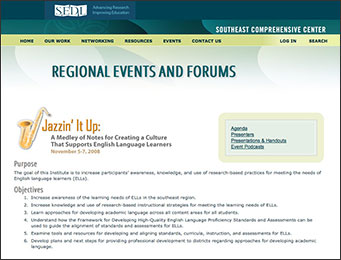Jazzin’ It Up: A Medley of Notes for Creating a Culture That Supports English Language Learners

Authors: Darlene Brown, Ramona Chauvin, Gail Del Greco, Lisa Raphael, Maggie Rivas, Maria Torres
| Price: Available free online |
Available online: electronic file
![]()
Creating a culture that supports English Language Learners (ELLs) through the use of research-based instructional strategies and targeted approaches was the focus of a regional institute held by the Southeast Comprehensive Center (SECC). The institute took place November 5–7, 2008, in New Orleans, Louisiana. The goal of this institute was to increase participants’ awareness, knowledge, and use of research-based practices for meeting the needs of ELLs. Teams from the states served by SECC—Alabama, Georgia, Louisiana, Mississippi, and South Carolina—as well as the state of Texas, which is served by the Texas Comprehensive Center, participated in the institute. To set the stage for the event, Laureen Laglagaron discussed the landscape in our region, Kristina Anstrom and Patricia DiCerbo focused on emerging ELL communities, and Robin Scarcella and Mabel Rivera discussed academic language across grade levels and content areas and teaching academic language to ELLs. SECC staff led additional topic discussions and coordinated work sessions for the state teams.
The objectives of the institute were to
- Increase awareness of the learning needs of ELLs in the southeast region.
- Increase knowledge and use of research-based instructional strategies for meeting the learning needs of ELLs.
- Learn approaches for developing academic language across all content areas for all students.
- Understand how the Framework for Developing High-Quality English Language Proficiency Standards and Assessments can be used to guide the alignment of standards and assessments for ELLs.
- Examine tools and resources for developing and aligning standards, curricula, instruction, and assessments for ELLs.
- Develop plans and next steps for providing professional development to districts regarding approaches for developing academic language.
